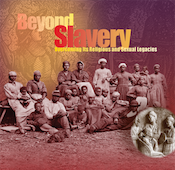Beyond Slavery
Explore the Conference
Explore the Conference by Subject
Slavery in Christian, Jewish, and Muslim Scripture and Religious Law
Christianity, Religion of the Slaveholders and the Enslaved
Sexual Assault and Exploitation Under U.S. Slavery and Jim Crow
How Slavery Has Shaped Our Understandings of Marriage and Friendship
Slavery, Violence, and the State
Beyond Slavery:
Overcoming Its Religious
& Sexual Legacy
Kecia Ali:
Slavery and Sexual Ethics
in Islam
Slavery is deeply embedded in Islamic texts and Muslim history. Indeed, even men's sexual use of unfree women is approved in the Qur'an, attested in the sunnah-that is, the exemplary practice of the Prophet Muhammad-and explicitly sanctioned by classical Islamic jurisprudence. Yet the vast majority of contemporary Muslims forcefully reject slavery as unacceptable in the modern world. This leaves Muslims with a puzzle: How is it possible to resolve tensions between Islamic law, which many Muslims still treat as authoritative, and contemporary values? Considering the early Muslim acceptance of slavery to be a product of its time that is not integral to the tenets of the faith opens the way for a solution. Rejecting the historical acceptance of slavery frees Muslims to consider the history and context behind the development of other elements of Islamic law as well, including the many linkages between marriage and slavery that are applied to women. Thus Muslims become able to treat the Qur'an as revelatory guidance rather than literal law. This is a step toward thinking through an Islamic ethics of sex.
This video was recorded on October 15-16, 2006 as part of the conference, "Beyond Slavery: Overcoming Its Religious and Sexual Legacy." It was sponsored by the Feminist Sexual Ethics Project in the Near Eastern and Judaic Studies Department at Brandeis University.
